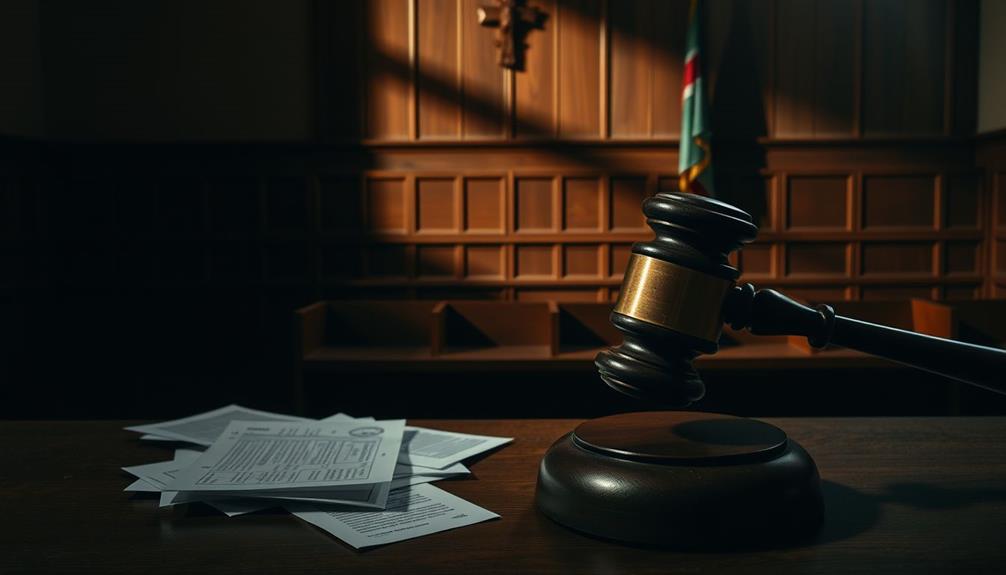Maneuvering the legal system with Borderline Personality Disorder (BPD) poses significant challenges. You might find that impulsivity and emotional instability complicate assessments of culpability in criminal cases. Misdiagnoses often occur, as BPD can be mistaken for other disorders. Social stigma further exacerbates bias in court, influencing juror perceptions of those with BPD as manipulative or dangerous. This stigma and misunderstanding can lead to harsher sentences and inadequate legal protections. Understanding the complex interplay between BPD and the law is essential for fair outcomes. Keep exploring to uncover more about these intricate challenges and their implications.
Key Takeaways
- BPD symptoms, such as impulsivity and emotional instability, complicate legal assessments and can lead to misinterpretations of a defendant's intent.
- The use of BPD in insanity defenses is limited due to legislative amendments and challenges in proving emotional dysregulation in court.
- Social stigma and negative media portrayals contribute to biased perceptions of individuals with BPD, influencing jury decisions and legal outcomes.
- Expert testimony is essential in BPD cases, but the complexity of the disorder often leads to contested verdicts regarding mental state and culpability.
- Treatment barriers and stigma hinder individuals with BPD from receiving appropriate care, further complicating their interactions with the legal system.
Overview of BPD and Legal Issues

Borderline Personality Disorder (BPD) poses significant challenges within the legal system, affecting both defendants and legal professionals. This mental illness impacts around 1.4% of American adults and is marked by symptoms of impulsivity and emotional instability. Individuals with BPD often exhibit intense episodes of anger, depression, and anxiety, which can exacerbate legal situations.
These characteristics can complicate legal assessments, making it difficult to accurately interpret a defendant's mental state during trials. The impulsive behaviors associated with BPD often increase the risk of criminality, raising concerns about the efficacy of legal defenses. You might notice that individuals with BPD experience intense emotional swings, which can lead to erratic actions in courtroom settings.
Such emotional intensity can manipulate perceptions of guilt, creating additional hurdles for judges and juries trying to assess culpability. Moreover, misdiagnosis is a frequent issue, as BPD can be confused with other disorders like PTSD or ADHD. This confusion complicates legal evaluations, further obscuring the true nature of a defendant's mental health.
As you can see, the intersection of BPD and the legal system is fraught with challenges that require careful navigation by all involved to guarantee fair and just outcomes.
Insanity Defense and BPD

The complexities surrounding the legal system and BPD extend to the application of the insanity defense. Individuals with BPD often face challenges due to their impulsive behavior and emotional dysregulation, which can lead to criminal behavior. This raises significant questions about their culpability.
Historically, legislative amendments have restricted the use of personality disorders, including BPD, in insanity defense claims. This exclusion complicates the legal argument for those with BPD who might struggle to control their actions during an episode. While some argue that emotionally unstable individuals can't distinguish right from wrong, others believe they retain enough awareness to understand their actions.
The following table summarizes the emotional impact of this debate:
| Aspect | BPD Implications | Legal Consequences |
|---|---|---|
| Emotional Dysregulation | Impulsive, unpredictable | Challenges in proving insanity |
| Criminal Behavior | Actions may stem from distress | Questions of culpability arise |
| Court Outcomes | Inconsistency in rulings | Varying interpretations of mental state |
These factors contribute to the ongoing controversy surrounding BPD and the insanity defense within the legal system.
Assessment of BPD in Legal Contexts

In legal contexts, evaluating BPD can be particularly challenging due to the disorder's complex symptoms. The assessment of Borderline Personality Disorder often involves various psychological testing tools, like the MMPI and PAI, which can identify symptoms such as impulsivity and emotional instability.
Additionally, individuals with BPD may struggle with chronic feelings of emptiness and difficulties in maintaining stable self-images, complicating their evaluations in legal settings. However, these tools mightn't always align with major psychiatric diagnoses, complicating legal evaluations.
Moreover, the impulsive nature of BPD can considerably affect a person's capacity to understand and control their actions during criminal behavior. This raises questions about their competency and the appropriateness of insanity defenses.
Legal definitions of mental disorders can vary across jurisdictions, leading to inconsistent evaluations regarding BPD. Forensic psychiatry plays a critical role in this process, as expert testimony must clarify the disorder's complexities and its links to trauma, including the causes and risk factors involved.
Misdiagnosis is common, with BPD symptoms often mistaken for other mental health conditions. As a result, thorough and accurate psychological evaluations are essential to guarantee that the nuances of Borderline Personality Disorder are properly understood in legal contexts, ultimately impacting justice outcomes.
Expert Testimony and BPD Cases

Expert testimony plays a pivotal role in cases involving individuals with Borderline Personality Disorder (BPD), especially when evaluating their mental state during criminal proceedings. The impulsivity and emotional instability characteristic of BPD can complicate assessments of a defendant's behavior, often leading to trust issues with boyfriends that mirror the complexities of personal relationships.
Forensic psychiatrists provide vital insights into how symptoms like fear of abandonment and mood swings affect actions relevant to legal standards. When courts consider expert testimony, they look at the clinician's qualifications and the testability of their opinions.
Adherence to established legal standards, such as those outlined in Daubert v. Merrell Dow, greatly influences the reliability of the testimony. Courts often grapple with the implications of BPD, particularly regarding a defendant's ability to control their actions and the degree of culpability in criminal behavior.
The complexity of BPD symptoms can lead to contested legal verdicts, especially concerning insanity defenses. Historical cases reveal varying interpretations of mental illness, which can create challenges in the courtroom.
Understanding the nuances of expert testimony in BPD cases is essential for maneuvering these complex legal landscapes effectively.
Social Stigma and Legal Bias

When you think about mental illness, negative perceptions can shape how society views individuals with BPD, especially in legal contexts. This stigma often influences jury decisions and impacts how legal professionals approach cases involving BPD.
Understanding the importance of financial literacy can also play a role, as individuals facing legal challenges may struggle with budgeting and managing expenses during difficult times.
Additionally, media portrayals can reinforce these biases, making it harder for those affected to navigate the legal system fairly.
Perceptions of Mental Illness
Social stigma surrounding borderline personality disorder (BPD) can considerably distort how individuals with this condition are perceived, often leading to harmful stereotypes that label them as manipulative or dangerous.
These perceptions can have serious consequences, especially in legal settings, where biases can skew legal outcomes. Additionally, the misunderstanding of mental health conditions leads to a lack of appropriate cold medications for those affected, further complicating their situation.
Consider the following points:
- Many people associate BPD with violent behavior, despite the reality being rooted in emotional instability.
- Legal professionals often lack understanding of personality disorders, leading to discrimination in court.
- Legislative changes reflect societal biases against BPD, restricting access to appropriate legal defenses.
When you look at these aspects, it's clear that the stigma surrounding mental illness, particularly personality disorders like BPD, can lead to severe discrimination.
This misunderstanding not only affects individual lives but also shapes public perceptions, further complicating legal challenges. As these biases persist, individuals with BPD face uphill battles in securing fair treatment and justice.
It's crucial to challenge these distorted perceptions and advocate for better understanding, ensuring that mental illness is treated with the complexity it deserves.
Impact on Legal Proceedings
Despite the growing awareness of mental health issues, individuals with Borderline Personality Disorder (BPD) often find themselves facing significant hurdles in legal proceedings due to pervasive social stigma. This stigma can lead to misconceptions about your behavior and motivations, which can adversely affect how juries perceive you.
If you have BPD, jurors might see you as manipulative or untrustworthy, largely due to your emotional instability and impulsive actions. Philosophical exploration encourages deeper self-reflection, which can help in understanding the complexities of mental health conditions like BPD, especially in high-stakes situations such as legal battles.
The impulsive nature of BPD complicates the assessment of criminal responsibility. You might struggle to control your actions during heightened emotional states, which can cloud the jury's understanding of your intent.
Historical cases reveal that juries often find it challenging to differentiate between BPD symptoms and genuine criminal intent, complicating the outcomes of your legal battles.
Moreover, misunderstandings about BPD can result in insufficient legal protections and inadequate representation. This lack of understanding can lead to harsher sentences or a dismissal of legitimate mental health concerns in court.
As a result, maneuvering through the legal system becomes an uphill battle for those of you diagnosed with BPD, highlighting the urgent need for informed perspectives in legal contexts.
Media Influence on Bias
Many people don't realize how greatly media portrayals shape public perception of Borderline Personality Disorder (BPD) and its impact on legal bias. The sensationalism surrounding mental illness in news can lead to harmful stereotypes that distort understanding. This bias doesn't just affect opinions; it can have real consequences in the courtroom.
For instance, the way celebrities are often misrepresented in popular culture influences public attitudes; recent discussions about celebrity relationships illustrate how narratives can skew perceptions.
Consider these points:
- Misrepresentation of individuals with BPD as dangerous fuels a fear-based stigma.
- High-profile cases often highlight violent acts, overshadowing the clinical realities of BPD.
- Stigmatization discourages those affected from seeking treatment, complicating their legal interactions.
These influences create a cycle where legal bias against people with BPD becomes entrenched. Jurors, swayed by these negative portrayals, may make decisions based on fear rather than facts.
This not only affects trial outcomes but also reinforces the stigma surrounding mental illness, making it harder for individuals with BPD to receive fair treatment in the legal system. Understanding the media's role is essential for addressing these biases and fostering a more compassionate view of BPD.
Treatment Challenges for Individuals With BPD

Treatment challenges for individuals with Borderline Personality Disorder (BPD) are significant and multifaceted. The impulsivity and emotional instability that characterize BPD can complicate your engagement with treatment and compliance with therapeutic interventions.
While Dialectical Behavior Therapy (DBT) is recognized as the most effective approach, many people face barriers to accessing specialized programs, creating gaps in necessary care. Additionally, the need for effective risk management strategies in treatment is vital, as individuals with BPD may struggle with impulsive decisions that can impact their overall well-being, similar to how risk management strategies for Bitcoin IRAs can help mitigate volatility in investments.
Furthermore, healthcare providers often lack the training needed to recognize and treat BPD effectively. This can lead to misdiagnosis and treatment plans that fail to address your unique needs.
Stigma surrounding BPD further complicates matters, as many perceive your behaviors as manipulative rather than symptomatic of a serious mental health condition.
Moreover, the high rates of comorbidity with other mental health disorders, like depression and substance use, can create additional hurdles in formulating thorough treatment strategies.
As a result, finding appropriate care that effectively addresses both BPD and any co-occurring issues can feel overwhelming. It's important to advocate for yourself and seek out healthcare providers who understand the complexities of your situation.
High-Profile Cases Involving BPD

Understanding the treatment challenges faced by individuals with Borderline Personality Disorder (BPD) sets the stage for examining how these difficulties manifest in high-profile legal cases. When you look at these cases, you often see the impact of emotional dysregulation and impulsivity, which complicate the criminal justice system's assessment of responsibility.
Additionally, the importance of proper support and understanding in managing such conditions can be likened to the need for effective toilet maintenance in preventing larger issues down the line.
Consider the following emotional implications:
- Violence and Tragedy: High-profile cases, like Andrea Yates, who drowned her children, raise questions about mental state and culpability.
- Societal Stigma: The portrayal of BPD in media often reinforces stigma, leading to misunderstanding and fear around those diagnosed.
- Legal Consequences: Many with BPD face legal issues related to their emotional instability, affecting their lives and the lives of others.
These high-profile cases highlight how BPD can lead to tragic outcomes, complicating legal definitions of sanity and criminal responsibility.
The stigma surrounding BPD not only affects public perception but can also influence legal outcomes for individuals caught in the web of emotional and psychological turmoil. Understanding these nuances is essential for a more compassionate approach to BPD in the legal system.
Conclusion
Maneuvering the legal system with BPD is like walking a tightrope—one misstep can lead to a fall. Understanding the nuances of this complex disorder is essential for justice. By addressing the stigma and improving assessments, we can create a more compassionate approach. Just as a lighthouse guides ships through stormy seas, informed legal practices can illuminate the path for individuals with BPD, ensuring they receive fair treatment in a system often shrouded in misunderstanding.
Theresa is the visionary force behind Borderline Syndrom, steering our content towards excellence and integrity. With a keen eye for detail and a deep understanding of BPD, she ensures that our articles, stories, and resources offer our readers valuable insights, hope, and guidance. Theresa’s leadership not only shapes our editorial direction but also fosters a space where voices on BPD are heard and respected.










